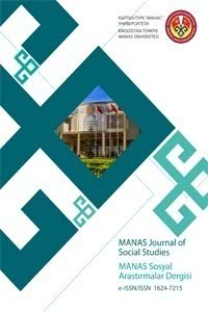Tarım ve Hayvancılık Sektöründe Çalışan Afgan Göçmenlerde Ekonomik Konumlanma ve Entegrasyon: Trakya Bölgesi Örneği
Afgan Göçmenler, Ekonomik Konumlanma, Entegrasyon, Tarım ve Hayvancılık Sektörü, Trakya Bölgesi
Economic Positioning and Integration of Afghan Immigrants Working in Agriculture and Livestock Sector: The Case of Thrace Region
Afghan Migrants, Economic Positioning, Integration, Agriculture and Livestock Sector, Thrace Region,
___
- Alakuş, E. ve Uzan, Y. (2020). İnsan Ticaretine Konu Olma Potansiyeli Bakımından Türkiye’nin Afgan Düzensiz Göçmen Gerçeği. Göç Araştırmaları Dergisi, 6(1), 92-117.
- Bartram, D., Poros, M. V., and Monforte, P. (2017). Göç Meselesinde Temel Kavramlar. Itır Ağabeyoğlu Tuncay (Çev.), Ankara: Hece Yayınları.
- Becchetti, L., ve Rossetti, F. (2009). When money does not buy happiness: The case of “frustrated achievers”. The Journal of Socio-Economics, 38(1), 159-167.
- Boccagni, P. (2017). Aspirations and the subjective future of migration: Comparing views and desires of the “time ahead” through the narratives of immigrant domestic workers. Comparative Migration Studies, 5, 4. https://doi.org/10.1186/s40878-016-0047-6
- Borselli, M. ve van Meijl, T. (2020). Linking migration aspirations to integration prospects: The experience of Syrian refugees in Sweden. Journal of Refugee Studies. 34(1), 579-595.
- Bozok, N. ve Bozok, M. (2018). “Göçmen İstekleri” Yaklaşımı Işığında Beykoz, Karasu Mahallesi’ndeki Refakatsiz Afgan Göçmen Çocukların Yaşamlarını Sürdürme Mücadeleleri. Moment Dergi, Yaratıcı Endüstriler ve Yaratıcı Emek, 416-440.
- Brzozowski, J. ve Coniglio, N. (2021). International migration and the (un)happiness push: Evidence from Polish longitudinal data. International Migration Review, 55(4). https://doi.org/10.1177/01979183211004835
- Carling, J. (2002). Migration in the Age of Involuntary Immobility: Theoretical Reflections and Caper Verdean Experiences. Journal of Ethnic and Migration Studies, 2 (1), 5–42.
- Carling, J. (2014). The Role of Aspirations in Migration. Determinants of International Migration Conference, University of Oxford, 23–25 Eylül 2014. https://jorgencarling.org/2014/09/23/the-role-of-aspirations-in- migration/. Erişim Tarihi: 17 Temmuz 2023.
- Carling, J. ve Collins, F. (2018). Aspiration, Desire and Drivers of Migration. Journal of Ethnic and Migration Studies. 44(6). https://doi.org/10.1080/1369183X.2017.1384134. 909-926.
- Carling, J. ve Schewel, K. (2018). Revisiting aspiration and ability in international migration. Journal of Ethnic and Migration Studies, 44(6), 945–963.
- Castles, S., Cubas, M. A., Kim, C. ve Ozkul, D. (2012). “Irregular migration: Causes, patterns, and strategies”. I. Omelaniuk (Ed.), Global perspectives on migration and development. Global Migration Issues,1, 117–151.
- Chen, J., Kosec, K. ve Mueller, V. (2019). Moving to despair? Migration and wellbeing in Pakistan. World Development, 113, 186–203
- Copestake, J. ve Camfeld, L. (2010). Measuring multidimensional aspiration gaps: A means to understanding cultural aspects of poverty. Development Policy Review, 28(5), 617–633.
- Cortes, K. E. (2004). Are Refugees Different from Economic Immigrants? Some Empirical Evidence on the Heterogeneity of Immigrant Groups in the United States. The Review of Economics and Statistics, 86(2), 465- 480.
- Çakırer Özservet, Y. (2013). İstanbul Zeytinburnu İlçesinde Afgan Türklerinin Ulusötesi Kentleşme Ağlarının Analizi. İnsan ve Toplum Bilimleri Dergisi, 2(2013), 163-181.
- Çörtoğlu Koca, S. (2022). Türkiye’de Düzensiz Göçmen Olarak Bulunan Afganların Hukuki Statülerine İlişkin Değerlendirmeler. Public and Private International Law Bulletin, 42(2), 873-912.
- de Haas, H. (2014). Migration theory, Quo Vadis. Oxforsd University International Migration Institute Workin Papers. https://www.migrationinstitute.org/publications/wp-100-14. Erişim Tarihi: 10 Haziran 2023.
- Genicot, G., ve Ray, D. (2017). Aspirations and Inequality. Econometrica, 85(2), 489–519.
- Geyik Yıldırım, S. (2018). Göç ve Afganlar: “İstikrarlı Mülteciler”. Göç Araştırmaları Dergisi, 4(2), 128-159.
- Gosselin A, Desgrées du Loû A, Lelièvre E, Lert F, Dray-Spira R, Lydié N; Parcours Study Group (2018). Understanding Settlement Pathways of African Immigrants in France Through a Capability Approach: Do Pre- migratory Characteristics Matter? Eur J Popul., 34(5), 849-871.
- Güler, H. (2020). Afganlı Göçmenlerin Göç Süreçleri ve İşçilik Deneyimleri: Uşak İli Örneği. Çalışma ve Toplum, 3(66), 1461-1482.
- Karadağ, S. (2021). İstanbul’un Hayaletleri Güvencesizliğin Kıyısında Afganlar. Göç Araştırmaları Derneği Yayını. https://gocarastirmalaridernegi.org/tr/calismalar/arastirmalar/istanbul-un-hayaletleri-guvencesizligin- kiyisinda-afganlar/192-istanbul-un-hayaletleri-guvencesizligin-kiyisinda-afganlar-raporu-yayinlandi. Erişim Tarihi: 1 Ağustos 2023
- Knight, J. ve Gunatilaka, R. (2010). Great expectations? The subjective wellbeing of rural-urban migrants in China. World Development, 38(1), 113–124.
- Maqul, S. A., Güneş, S., and Akin, T. (2021). The Comparative Analysis of Life Satisfaction Among Syrian, Iranian, and Afghan refugees in Turkey: The case of Denizli. Journal of Refugee Studies, 34(2), 2376-2393.
- Mayblin, L. (2019). Imagining asylum, governing asylum seekers: Complexity reduction and policy making in the UK Home Office. Migration Studies, 7(1), 1–20.
- Mähönen, T. A., Leinonen, E. ve Jasinskaja-Lahti, I. (2013). Met expectations and the wellbeing of diaspora immigrants: A longitudinal study. International Journal of Psychology, 48(3), 324–333.
- Obi, C., Slosse, W., Bartolini, F., Dessein, J., and D’Haese, M. (2023). Understanding Integration Experience and Wellbeing of Economic-Asylum Seekers in Italy: the Case of Nigerian Immigrants. Int. Migration & Integration 24, 189–210 (2023).
- Schunk, R. (2014). “Immigrant Integration, Transnational Activities and the Life Course”. M. Wingens, M. Windzio,H. d. Valk ve C. M. Aybek içinde (Ed.), A Life-Course Perspective on Migration and Integration, pp. 259- 282, Dordrecht:Springer.
- Stillman, S., Gibson, J., McKenzie, D. ve Rohorua, H. (2015). Miserable migrants? Natural experiment evidence on international migration and objective and subjective wellbeing. World Development, 65, 79–93.
- Tümtaş, M. S. (2022). Nöbetleşe Dışlanma Zincirinde Son Halka: Düzensiz Afgan Göçmenler. Akdeniz İnsani Bilimler Dergisi, 12, 217-228.
- van Heelsum, A. (2017). Aspirations and frustrations: Experiences of recent refugees in the Netherlands. Ethnic and Racial Studies, 40(13), 2137–2150.
- Wang, M., Ning, Y. (2016). The Social Integration of Migrants in Shangai's Urban Villages. China Review, 16(3), 93-120.
- ISSN: 1694-7215
- Yayın Aralığı: Yılda 4 Sayı
- Başlangıç: 2001
- Yayıncı: Kırgızistan Türkiye Manas Üniversitesi
Tarih Yazımında Meşruiyetçilik Anlayışının Osmanlı Kroniklerine Yansıması
Sekizinci Sınıf Öğrencilerinin Üslü İfadelerle İlgili Matematiksel Düşünme Süreçlerinin İncelenmesi
Makina Kalıp Endüstrisinde Değişim Yönetimi: Bursa’da Bir Araştırma
Suriyeli Öğrencilerin Yoğun Olduğu Sınıflarda Öğretmenlerin Yaşadığı Sorunlar ve Çözüm Önerileri
Öğretmenlik Mesleğine Adanmışlığın Sıralı Lojistik Regresyon Analizi ile İncelenmesi
Türkiye'de E-portfolyo Konusunda Gerçekleştirilen Tezlerin Analizi: Bir Meta-sentez Çalışması
Mustafa ŞANLI, Funda BAKIRCI, Zehra LÜY, Murat ARTSIN, Leila ASSADZADEH, Demet Hatice SOMUNCUOĞLU ÖZERBAŞ
Beden Eğitimi ve Oyun Öğretim Programının Uygulanmasına İlişkin Sınıf Öğretmenlerinin Görüşleri
